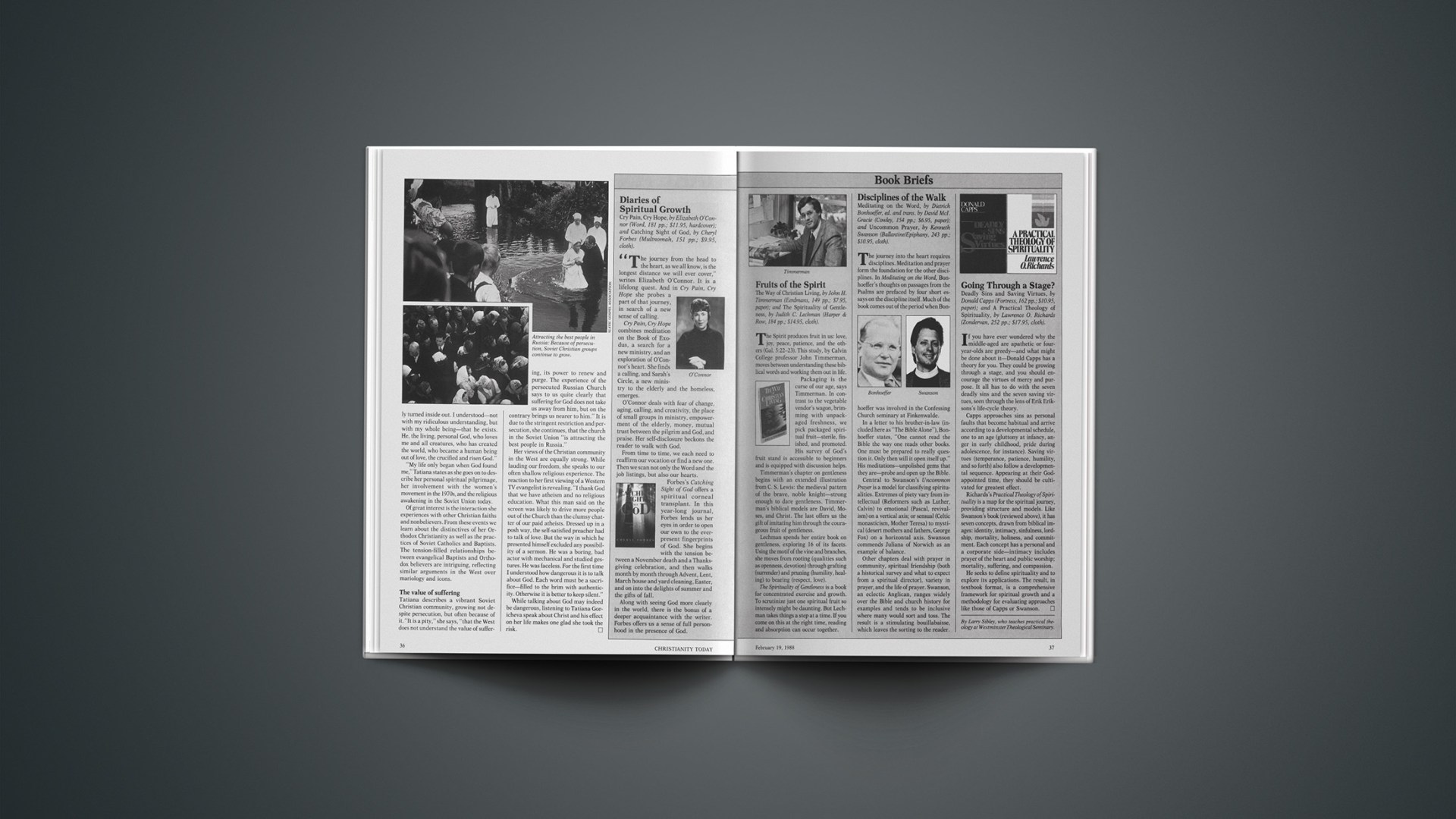Fruits Of The Spirit
The Way of Christian Living, by John H. Timmerman (Eerdmans, 149 pp.; $7.95, paper); and The Spirituality of Gentleness, by Judith C. Lechman (Harper & Row, 184 pp.; $14.95, cloth).
The Spirit produces fruit in us: love, joy, peace, patience, and the others (Gal. 5:22–23). This study, by Calvin College professor John Timmerman, moves between understanding these biblical words and working them out in life.
Packaging is the curse of our age, says Timmerman. In contrast to vegetable vendor’s wagon, brimming with unpackaged freshness, we pick packaged spiritual fruit—sterile, finished, and promoted. His survey of God’s fruit stand is accessible to beginners and is equipped with discussion helps.
Timmerman’s chapter on gentleness begins with an extended illustration from C. S. Lewis: the medieval pattern of the brave, noble knight—strong enough to dare gentleness. Timmerman’s biblical models are David, Moses, and Christ. The last offers us the gift of imitating him through the courageous fruit of gentleness.
Lechman spends her entire book on gentleness, exploring 16 of its facets. Using the motif of the vine and branches, she moves from rooting (qualities such as openness, devotion) through grafting (surrender) and pruning (humility, healing) to bearing (respect, love).
The Spirituality of Gentleness is a book for concentrated exercise and growth. To scrutinize just one spiritual fruit so intensely might be daunting. But Lechman takes things a step at a time. If you come on this at the right time, reading and absorption can occur together.
Disciplines Of The Walk
Meditating on the Word, by Dietrich Bonhoeffer, ed. and trans. by David Mcl. Gracie (Cowley, 154 pp.; $6.95, paper); and Uncommon Prayer, by Kenneth Swanson (Ballantine/Epiphany, 243 pp.; $10.95, cloth).
The journey into the heart requires disciplines. Meditation and prayer form the foundation for the other disciplines. In Meditating on the Word, Bonhoeffer’s thoughts on passages from the Psalms are prefaced by four short essays on the discipline itself. Much of the book comes out of the period when Bonhoeffer was involved in the Confessing Church seminary at Finkenwalde.
In a letter to his brother-in-law (included here as “The Bible Alone”), Bonhoeffer states, “One cannot read the Bible the way one reads other books. One must be prepared to really question it. Only then will it open itself up.” His meditations—unpolished gems that they are—probe and open up the Bible.
Central to Swanson’s Uncommon Prayer is a model for classifying spiritualities. Extremes of piety vary from intellectual (Reformers such as Luther, Calvin) to emotional (Pascal, revivalism) on a vertical axis; or sensual (Celtic monasticism, Mother Teresa) to mystical (desert mothers and fathers, George Fox) on a horizontal axis. Swanson commends Juliana of Norwich as an example of balance.
Other chapters deal with prayer in community, spiritual friendship (both a historical survey and what to expect from a spiritual director), variety in prayer, and the life of prayer. Swanson, an eclectic Anglican, ranges widely over the Bible and church history for examples and tends to be inclusive where many would sort and toss. The result is a stimulating bouillabaisse, which leaves the sorting to the reader.
Going Through A Stage?
Deadly Sins and Saving Virtues, by Donald Capps (Fortress, 162 pp.; $10.95, paper); and A Practical Theology of Spirituality, by Lawrence O. Richards (Zondervan, 252 pp.; $17.95, cloth).
If you have ever wondered why the middle-aged are apathetic or four-year-olds are greedy—and what might be done about it—Donald Capps has a theory for you. They could be growing through a stage, and you should encourage the virtues of mercy and purpose. It all has to do with the seven deadly sins and the seven saving virtues, seen through the lens of Erik Eriksons’s life-cycle theory.
Capps approaches sins as personal faults that become habitual and arrive according to a developmental schedule, one to an age (gluttony at infancy, anger in early childhood, pride during adolescence, for instance). Saving virtues (temperance, patience, humility, and so forth) also follow a developmental sequence. Appearing at their God-appointed time, they should be cultivated for greatest effect.
Richards’s Practical Theology of Spirituality is a map for the spiritual journey, providing structure and models. Like Swanson’s book (reviewed above), it has seven concepts, drawn from biblical images: identity, intimacy, sinfulness, lordship, mortality, holiness, and commitment. Each concept has a personal and a corporate side—intimacy includes prayer of the heart and public worship; mortality, suffering, and compassion.
He seeks to define spirituality and to explore its applications. The result, in textbook format, is a comprehensive framework for spiritual growth and a methodology for evaluating approaches like those of Capps or Swanson.
By Larry Sibley, who teaches practical theology at Westminster Theological Seminary.










